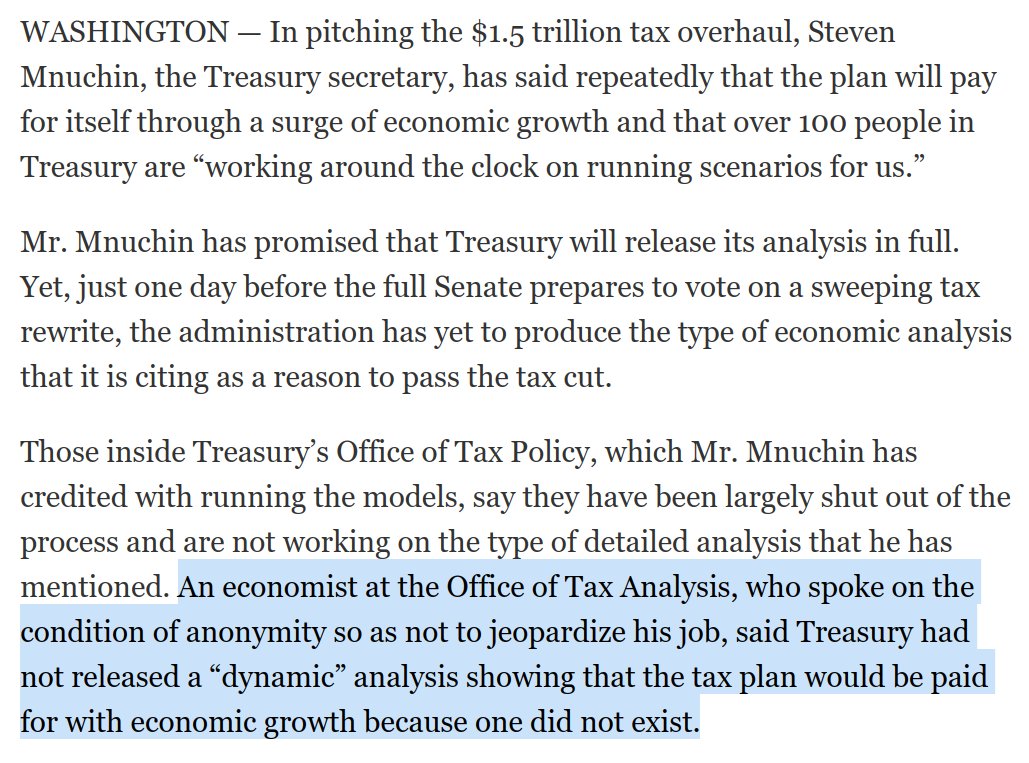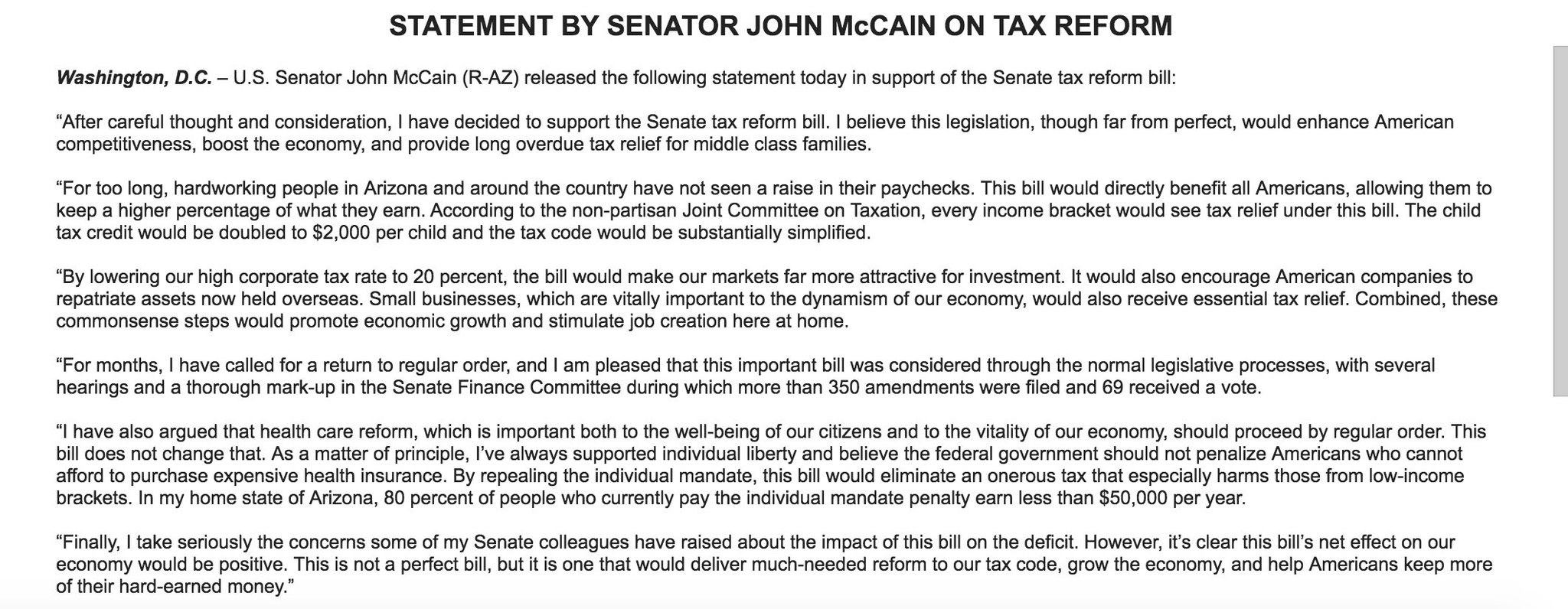It Started as a Tax Cut. Now It Could Change American Life.
It Started as a Tax Cut. Now It Could Change American Life.
By
PETER S. GOODMAN and
PATRICIA COHENNOV. 29, 2017
A job fair in Atlanta in last year. While Republicans promote their tax plan as a way to encourage job growth and economic expansion, its constraints on state and local taxation could restrict spending on health care, education, transportation and social services. Bob Andres/Atlanta Journal-Constitution, via Associated Press
The tax plan has been marketed by President Trump and Republican leaders as a straightforward if enormous rebate for the masses, a $1.5 trillion package of cuts to spur hiring and economic growth. But as the
bill has been
rushed through Congress with scant debate, its far broader ramifications have come into focus, revealing a catchall legislative creation that could reshape major areas of American life, from education to health care.
Some of this re-engineering is straight out of the traditional Republican playbook. Corporate taxes, along with those on wealthy Americans, would be slashed on the presumption that when people in penthouses get relief, the benefits flow down to basement tenements.
Some measures are barely connected to the realm of taxation, such as the lifting of a 1954
ban on political activism by churches and the conferring of a
new legal right for fetuses in the House bill — both on the wish list of the evangelical right.
With a potentially
far-reaching dimension, elements in both the House and Senate bills could constrain the ability of
states and local governments to levy their own taxes, pressuring them to limit spending on health care, education, public transportation and social services. In their longstanding battle to shrink government, Republicans have found in the tax bill a vehicle to broaden the fight beyond Washington.
The result is a behemoth piece of legislation that could widen American economic inequality while diminishing the power of local communities to marshal relief for vulnerable people — especially in high-tax states like
California and New York, which, not coincidentally, tend to vote Democratic.
All of this is taking shape at such extraordinary velocity, absent the usual analyses and hearings, that even the most savvy Washington lobbyist cannot be fully certain of the implications.
Mr. Trump and the Republican leadership in Congress — stymied in their efforts to repeal Obamacare, and short of legislative achievements — have signaled absolute resolve to get a tax bill passed by the end of the year. As the sense has taken hold that Washington is now a trading floor where any deal is worth entertaining so long as it brings votes, interest groups have fixed on the tax bill as a unique opportunity to further their agendas.
“There’s a Christmas-tree aspect to the bill,” said C. Eugene Steuerle, a Treasury official during the Reagan administration and now a senior fellow at the Urban Institute. As an example, he cited the
provisions in the House bill designed to
appeal to the religious right.
“People want to add certain things, and if they don’t cost a lot, it’s a way to buy in agreement,” Mr. Steuerle said.
Economists and tax experts are overwhelmingly skeptical that the bills in the House and Senate can generate meaningful job growth and economic expansion. Many view the legislation not as a product of genuine deliberation, but as a transfer of wealth to corporations and affluent individuals — both generous purveyors of campaign contributions. By 2027, people making $40,000 to $50,000 would pay a combined $5.3 billion more in taxes, while the group earning $1 million or more would get a $5.8 billion cut, according to the
Joint Committee on Taxation and the Congressional Budget Office.
“When you put all these pieces together, what you’re left with is we are squandering a giant sum of money,” said Edward D. Kleinbard, a former chief of staff at the Congressional Joint Committee on Taxation who teaches law at the University of Southern California. “It’s not aimed at growth. It is not aimed at the middle class. It is at every turn carefully engineered to deliver a kiss to the donor class.”
In a recent University of Chicago
survey of 38 prominent economists across the ideological spectrum, only one said the proposed tax cuts would yield substantial economic growth. Unanimously, the economists said the tax cuts would add to the long-term federal debt burden, now
estimated at more than $20 trillion.
Republican Tax Plan: How to Make Sense of the Push in Congress
It’s virtually impossible to fully understand, let alone keep up with, the flood of proposals, amendments and analyses that continue to pour out. Here are some of the big-picture ideas to keep in mind as this political sausage is being made.

If the package does have a guiding philosophy, it is a return to trickle-down economics, an enduring story line in which the wealthy are supposed to spend and invest their tax breaks, creating jobs and commercial opportunities for everyone else.
As President Ronald Reagan slashed taxes in the 1980s, he argued that citizens, not bureaucrats, should decide how to spend their money. President George W. Bush bestowed enormous tax cuts on the affluent.
But the trickle-down story has yet to achieve its promised happy ending. Only the beginning reliably transpires, the part where wealthy people get relief. The spoils of resulting economic growth have largely been monopolized by those with the highest incomes. Pay for most American workers has been
stagnant since the mid-1970s, after the rising costs of housing, health care and other basics are factored in.
Nonetheless, Republicans are staging a trickle-down revival.
“Either it’s a religious belief, a belief where no amount of evidence would change that, or they are using the argument cynically and they just want more money for themselves,” the economist Joseph E. Stiglitz, a Nobel laureate, said.
Mr. Stiglitz has long warned of the perils of growing inequality while deriding tax-cutting inclinations. Yet even those who have favored lighter tax burdens are critical of the current proposals.
In the late 1970s, Bruce Bartlett developed what would become the locus of the Reagan tax cuts while working for Representative Jack Kemp, a conservative Republican from New York. Those cuts helped cushion the pain from sharp increases in interest rates by the Federal Reserve, Mr. Bartlett maintains. But Reagan was lowering the highest tax rate on individuals from 70 percent down to 28 percent by 1986.
“What they have here is a big tax cut for the rich paid for with random increases in taxes for various constituencies,” Mr. Bartlett said. “It’s ridiculous. And it’s telling that they are ramming this through without any debate. All of the empirical evidence goes against the tax cut.”
The meat of the package is a permanent lowering of the corporate tax rate, to 20 percent from 35 percent, which business leaders have long wanted. Proponents assert that this would prompt multinational companies to expand operations in the United States.
“We’ve been bleeding corporate headquarters and production for a long time,” said Douglas Holtz-Eakin, a former director of the Congressional Budget Office and now president of the American Action Forum, a nonprofit that promotes smaller government.
But recent history suggests that when corporations get tax relief, they find abundant uses for money that do not involve paying higher wages. They give dividends to shareholders and stock options to executives. They stash
earnings in tax havens.
In 2004, Congress invited American corporations to bring home overseas earnings at a sharply reduced rate, pitching it as a means of bolstering investment. But the corporations spent as much as 90 percent of their windfall buying back their shares, according to Bureau of Economic Analysis research.
If Congress bestows fresh relief on major businesses, signs suggest a similar result. Many companies are enjoying record profits. Those in the Fortune 500 had $2.6 trillion salted away overseas as of last year.
“In our boardroom, the number-one thing we’re talking about is not taxes,” said Jeremy Stoppelman, chief executive of Yelp, the online review platform. “Having a strong middle class out there spending money is what’s most important for our business.”
Republicans Say the $1.5 Trillion Tax Bill Pays For Itself, but Experts Disagree
There is no consensus among economists about the amount of growth that would occur under the plan, but key models predict it would not cover its cost.












